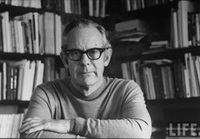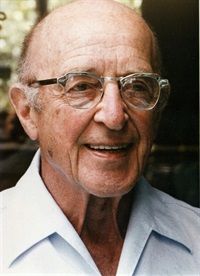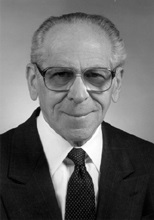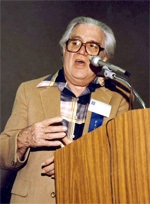EP85 Panel 13 - History of Psychotherapy - Rollo R. May, PhD; Carl R. Rogers, PhD.; Thomas S. Szasz, MD; Carl A. Whitaker, MD
- Average Rating:
- Not yet rated
- Topic Areas:
- Topical Panels | Psychotherapy | History of Psychotherapy | Experiential Therapy | Therapist Development
- Categories:
- Evolution of Psychotherapy | Evolution of Psychotherapy 1985 | Pioneers in Couples and Family Therapy
- Faculty:
- Rollo May, PhD | Carl Rogers, PhD | Thomas Szasz, MD | Carl Whitaker, MD
- Duration:
- 55 Minutes
- Format:
- Audio Only
- Original Program Date:
- Dec 14, 1985
- License:
- Never Expires.
Description
Description: Panelists Rollo May, Carl Rogers, Thomas Szasz, and Carl Whitaker explore psychotherapy's evolution. May traces its roots from ancient Greece to modern times, Rogers emphasizes client-centered therapy, Szasz critiques psychotherapy's myths, and Whitaker stresses practical approaches. The panel reflects on independent thinking and the risks of misusing therapeutic techniques. Moderated by Ann Wright-Edwards, MS.
Topical Panel 13 on the History of Psychotherapy, featuring Rollo R May, PhD, Carl R Rogers, PhD, Thomas S Szasz, MD, and Carl A Whitaker, MD.
Moderated by Ann Wright-Edwards, MS.
Educational Objectives:
- To compare and contrast clinical and philosophical perspectives of experts.
*Sessions may be edited for content and to preserve confidentiality*
Credits
Handouts
| Timestamped Transcript (684.5 KB) | 14 Pages | Available after Purchase |
Faculty

Rollo May, PhD Related Seminars and Products
Rollo R May, PhD In 1949, Rollo May received the first Ph/D in Clinical Psychology from Columbia University. In 1938, he was awarded a Master's of Divinity from Union Theological Seminary. Currently, he is in private practice in Tiburon, California. The author or co-authoer of 14 books, he is the recipient of many awards and honors for distingushed contributions and humanitarian work. He is one of the main proponents of humanistic approaches to psychotherapy and is the principal American interpreter of European existential thinking as it can be applied to psychotherapy.

Carl Rogers, PhD Related Seminars and Products
Carl Rogers, Ph.D, was an influential American psychologist and among the founders of the humanistic approach (or client-centered approach) to psychology. Rogers is widely considered to be one of the founding fathers of psychotherapy research and was honored for his pioneering research with the Award for Distinguished Scientific Contributions by the American Psychological Association (APA) in 1956. Carl received his Ph.D. in 1931 from Teachers College, Columbia University. Rogers has served as president of the American Psychological Association, the American Association for Applied Psychology, and the American Academy of Psychotherapists. He is the recepient of eight honorary doctorates and the Humanist of the Year Award from the American Humanist Association. The American Psychological Association offered him two awards: the Distinguished Scientific Contribution award for research in teh field of psychotherapy, and the first Distinguished Professional Contribution Award. Rogers also received the Award of Professional Achievements from the American Board of Professional Psychology. He is the author or co-author of 12 books and numerous articles in psychological, psychiatric, and educational journals dating from 1930.

Thomas Szasz, MD Related Seminars and Products
Thomas S. Szasz, (M.D., University of Cincinnati, 1944) was Professor of Psychiatry at the State University of New York, Upstate Medical Center in Syracuse. He was recipient of numerous awards, including the Humanist fo the Year Award from the American Humanist Association and the Distinguished Service Award from teh American Institute for Public Service. He has received a number of honorary doctorates and lectureships, and served on the editorial board or as consulting editor for ten journals.
Szasz has authored approximately 400 articles, book chapters, reviews, letters to the editor and columns. He has written 19 books.

Carl Whitaker, MD Related Seminars and Products
Carl Whitaker, MD, was an American physician and psychotherapy pioneer family therapist. Whitaker is most well-known for acknowledging the role of the entire family in the therapeutic process. He is the founder of experiential family therapy, or the symbolic-experiential approach to therapy. Rather than scapegoating one family member or even a specific family problem, experiential family therapy looks at the entire family system. Several other approaches to family therapy have drawn heavily from Whitaker's theories.


